Άμεση Εξυπηρέτηση Επειγόντων - Ερευνητικά Τεκμηριωμένες Παρεμβάσεις
Αυχεναλγία
Χειροπρακτική, Νευροδυναμική, Εξειδικευμένη άσκηση
Άμεση ανακούφιση
πόνου στον αυχένα
Επιλέξτε...
Οσφυαλγία
Χειροπρακτική, Νευροδυναμική, Εξειδικευμένη άσκηση
Άμεση ανακούφιση
πόνου στη μέση
Επιλέξτε...
Ισχιαλγία
Χειροπρακτική, Νευροδυναμική, Εξειδικευμένη άσκηση
Άμεση ανακούφιση
πόνου στο ισχίο
Επιλέξτε...
Brazilian lymphatic drainage
Οι πιο εξελιγμένες τενικές λεμφικού μασάζ
Μετεγχειριτική μάλαξη
Απώλεια πόντων, σύσφιξη
Επιλέξτε...
Φυσικοθεραπεία κατ' οίκον
Κατάγματα, νευρολογική φυσικοθεραπεία, γηριατρική φυσικοθεραπεία, επανεκπαίδευση βάδισης
Επιλέξτε...
Γιατί PhysioDanali
Εξειδικευμένος Φυσικοθεραπευτής
Χειροπρακτικός
Πανεπιστήμιο Δυτικής Αττικής
Πλήρης φορητός εξοπλισμός
Εξυπηρέτηση έως 23:00
Κυριακές και αργίες
Επιστημονική τεκμηρίωση
Άμεσα αποτελέσματα
Τι λένε οι ασθενείς... Διαβάστε περισσότερα
Αθανασία Α.
Ο κύριος Δανάλης είναι πολύ σωστός επαγγελματίας δίνει την απαραίτητη προσοχή στον ασθενή και στο πρόβλημα που έχει.Το πιο σημαντικό όμως είναι η ποιότητα και αποτελεσματικότητα της θεραπείας, με τρόπο δημιουργικό και κυρίως αποδοτικό. Τον προτείνω ανεπιφύλακτα.
Εριφύλη Σ.
Ο κος Δανάλης γνωρίζει πολύ καλά το αντικείμενό του και ασχολείται προσωπικά και πολύ με τον ασθενή του! Έχει θετική διάθεση και με έχει βοηθήσει πολύ!! Του έχω πολύ εμπιστοσύνη και τον συστήνω ανεπιφύλακτα.
Γιώτα Σ.
Γνωρίζει πολύ καλά το αντικείμενο του, και ασχολήθηκε πολύ ώρα με το πρόβλημα μου και πραγματικά κέρδισε την εμπιστοσύνη μου! Θα τον συστήσω σίγουρα!
Κλείστε Ραντεβού

Κωνσταντίνος Δανάλης, PT
Φυσικοθεραπευτής

Αδειούχος Φυσικοθεραπευτής μέλος του Πανελλήνιου Συλλόγου Φυσικοθεραπευτών και μέλος στα εξειδικευμένα τμήματα του Συλλόγου:
Επιστημονικό Τμήμα Μυοσκελετικής Φυσικοθεραπείας
Επιστημονικό Τμήμα Θεραπευτικής Άσκησης
Επιστημονικό Τμήμα Φυσικοθεραπείας για την Ψυχική Υγεία
Aπόφοιτος του Πανεπιστημίου Δυτικής Αττικής
Ειδικός σε:
Μυοσκελετικά προβλήματα και παθήσεις
Διαχείριση Σπονδυλικής Στήλης - Αυχεναλγίες, Οσφυαλγίες
Λεμφοίδημα και λεμφικό σύστημα
Εξειδικευμένη αντιμετώπιση λανθασμένων κινητικών προτύπων, νευρομυϊκού συντονισμού και άλλων αιτιών που έχουν σημαντικό αντίκτυπο στην καθημερινότητα του ασθενή, την κινητικότητα και τη λειτουργικότητά του, εν τέλει στην ποιότητα ζωής του.
Εφαρμόζει τις πιο σύγχρονες, επιστημονικά αποδεδειγμένες τεχνικές και θεραπείες για μυοσκελετικές παθήσεις, ανακούφιση του πόνου, και βελτίωση της λειτουργικότητας και της ποιότητας ζωής του ασθενή.







